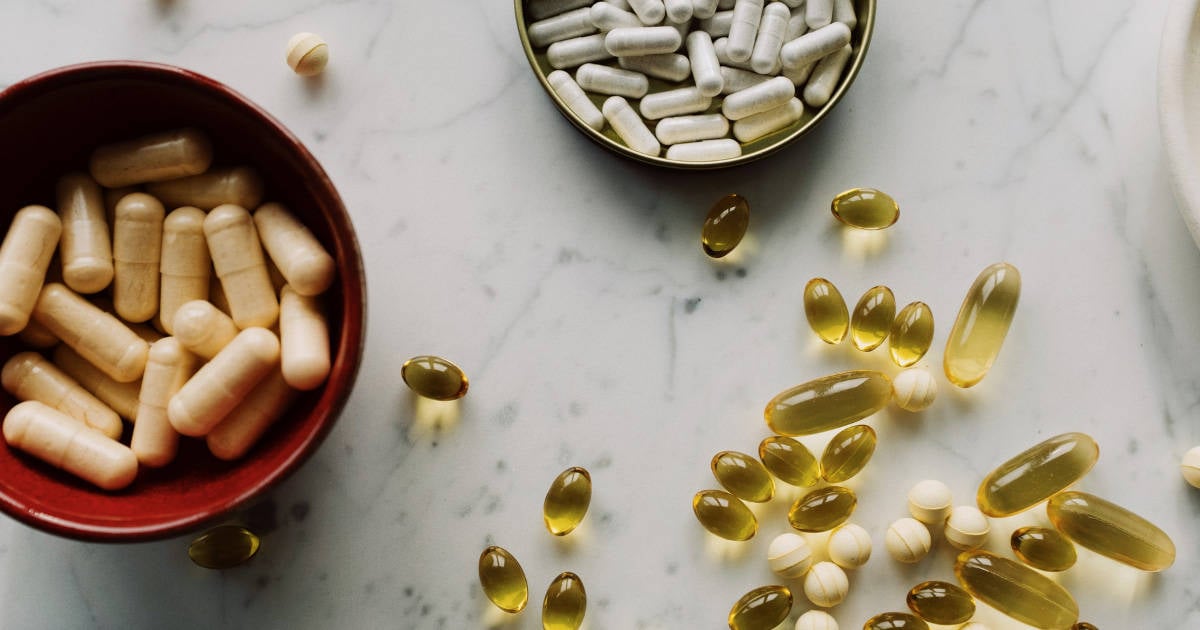People with diabetes face unique nutritional challenges, and an often-overlooked aspect of the dietary management of the condition is the supplementation of vitamins and minerals.
While current evidence on the direct impact of certain vitamins and minerals on diabetes is limited, it remains crucial for those with diabetes to focus on getting specific nutrients regularly.
This article will outline some of the most important vitamins for people with diabetes and provide guidance on how to consistently incorporate these essential nutrients into your diet.

Why do people with diabetes need certain vitamins?
In general, people with diabetes can digest and absorb vitamins as well as those without the condition (with the exception of people who have issues like gastroparesis, which affects digestion).
The role of supplements is to complement the diet, which is particularly important for those who might find it challenging to consume an adequate amount of fruits, vegetables, and other nutrient-rich foods.
However, whenever possible, it’s best to consume the vitamins and minerals you need through whole food sources, rather than supplements.
Consulting with a doctor prior to starting any supplementation is essential, as they can conduct blood work to identify any vitamin and mineral deficiencies. By collaborating with your healthcare team, you can determine the most suitable vitamin supplementation to align with your health needs and lifestyle.
If you will be pursuing supplements rather than a dietary approach to getting your recommended levels of these nutrients, look for the United States Pharmacopeia [USP] symbol on the bottle to ensure the safest products, as this means that the supplement has met the USP’s standards.
What are the best vitamins for people with diabetes?
Thiamin (B1)
People with type 1 or type 2 diabetes are often found to have lower blood levels of thiamin, putting them at an increased risk for thiamin deficiency. Thiamin, also known as vitamin B1, plays a crucial role in nerve health.
While there is some indication that it might aid in lessening symptoms of neuropathy (nerve damage), a complication common in diabetes, it’s important to note that research in this specific area is ongoing and results may vary. Additionally, taking vitamin B1 may only help with neuropathy in those who are deficient in this vitamin.
Major sources of thiamin include beef, pork, nuts, whole grains, legumes, cauliflower, oranges, eggs, potatoes, asparagus, and kale. Including these foods in a diet can help ensure adequate thiamin intake.
Vitamin B12
Vitamin B12 is essential for maintaining healthy red blood cells and supporting brain function. In people with diabetes who have peripheral neuropathy (nerve damage in their hands and/or feet), a deficiency in vitamin B12 could worsen symptoms.
There is evidence to suggest that long-term use of the diabetes drug metformin, especially in higher doses (typically 1,500 milligrams or more daily), may lead to decreased levels of vitamin B12. Therefore, monitoring B12 levels is important for those on metformin.
In terms of dietary sources, vitamin B12 is predominantly found in animal products such as fish, milk, eggs, and meat. For vegetarians, vegans, and others who may not consume enough vitamin B12 from dietary sources, oral vitamin B12 supplements can be an effective option to ensure adequate intake.
Vitamin C
Many people with diabetes may have lower levels of vitamin C. Increasing vitamin C intake can play a role in controlling sorbitol levels in the cells. At high concentrations, sorbitol can contribute to complications like retinopathy (damage to the retina in the eye) and kidney damage.
Additionally, vitamin C has been shown to potentially improve insulin sensitivity, helping with blood sugar regulation and A1c levels (a measure of glucose control over the previous 2 to 3 months).
Rich dietary sources of vitamin C include kiwi, bell peppers, tomatoes, guava, tomatillo, sweet potatoes, strawberries, and spinach.
Vitamin D
Vitamin D deficiencies have been associated with an increased risk of developing diabetes. Additionally, research has suggested that chronically low levels of vitamin D in people with type 1 diabetes, type 2 diabetes, or prediabetes may contribute to an increased risk of complications and death. It’s a common issue for many with diabetes to have lower levels of vitamin D.
To address this, it’s recommended to include vitamin D-rich foods in your diet, such as egg yolks, liver, fatty fish, fortified dairy products, fortified plant milk varieties, fortified soy products, and UV-exposed mushrooms.
Additionally, regular exposure to sunlight can naturally boost vitamin D levels in the body. Ideally, aiming for about 5 to 30 minutes of sun exposure per day, depending on your skin type and local climate, can be beneficial.
However, it’s important to balance sun exposure with skin cancer risk, especially in areas with high UV levels.
Magnesium
Magnesium plays an important role in maintaining a healthy immune system, strengthening bones, regulating heart rate, and helping the body digest and use nutrients from our daily diet. It’s especially crucial for people with type 2 diabetes, as they often have lower levels of this essential mineral.
Research has established a link between low magnesium levels and increased insulin resistance. Additionally, a 2017 study published in the journal Diabetes Care suggests that regular magnesium intake may reduce the risk of developing type 2 diabetes.
In terms of supplementation, magnesium is commonly taken along with calcium and zinc. However, it can also be obtained naturally through a diet rich in beans and other legumes, brown rice, nuts, green leafy vegetables, and whole grain products.
Omega-3 fatty acids
Omega-3 fatty acids are vital for heart health, a particularly important consideration if you have diabetes due to the increased risk of heart disease. These fatty acids help in reducing inflammation and improving cardiovascular health.
Regularly consuming omega-3 fatty acids can contribute to better overall health management in diabetes, including potentially better blood sugar control and reduced risk of cardiovascular complications.
Rich sources of omega-3 fatty acids include fatty fish like salmon, mackerel, and sardines, as well as plant-based options like flaxseeds, chia seeds, and walnuts. Incorporating these into your diet can help provide the necessary omega-3s to support heart health.
Zinc
Zinc plays a vital role in the creation, storage, and secretion of insulin, making it an essential mineral for people with diabetes. Its involvement in immune system functioning is also worth noting, since a robust immune system is crucial for overall health, especially in diabetes management.
A zinc deficiency can make blood sugar management more difficult and may worsen the complications associated with diabetes. Monitoring and maintaining adequate zinc levels is therefore important for optimal diabetes management.
Zinc can be found in a variety of foods, including oysters and other seafood, poultry, beef, pumpkin seeds, lentils, and yogurt. Ensuring a balanced diet that includes these foods can help in achieving the recommended zinc intake.
Areas of caution
For people with diabetes, special caution is required when it comes to supplementing with certain vitamins and other compounds.
High doses of niacin (vitamin B3) can potentially raise blood sugar levels, posing a challenge for blood sugar management. This is especially noteworthy for people using niacin in high doses for cholesterol management.
There is ongoing research into the impact of vitamin E on insulin sensitivity and diabetes management. However, it’s important to approach claims about its ability to prevent type 2 diabetes or significantly improve blood sugar control in people with diabetes with caution, pending further studies that can support these claims.
For people taking blood-thinning drugs such as warfarin (brand name Coumadin and others), it’s important to note that vitamin E supplements can interact with these medications and increase the risk of bleeding.
Vitamin K also requires careful consideration, especially for people on blood-thinning medications like warfarin, since it plays a crucial role in blood clotting processes. Significant fluctuations in vitamin K intake can impact the effectiveness of these medications.
Certain supplements can also potentially impact blood sugar levels or interact with diabetes medications. These include chromium, alpha-lipoic acid, certain herbal supplements, and others.
Because of these potential interactions and effects, it’s critically important to speak with your healthcare provider before incorporating these or any other vitamins or supplements into your regimen.
Final thoughts
While managing diabetes often focuses on blood sugar levels and medication, the role of vitamins, minerals, and other nutrients in this process cannot be overstated.
A well-rounded diet, rich with essential nutrients, is a cornerstone of effective diabetes management. Thiamin, vitamin B12, vitamin C, vitamin D, magnesium, omega-3 fatty acids, and zinc, among others, all play a unique role in supporting the health of people with diabetes.
It’s important to consult with your healthcare team to determine the appropriate intake of vitamins and minerals for your specific needs and to be aware of any supplements that should be avoided in your situation.
Your doctor may conduct blood tests to determine your nutritional requirements, and incorporating the right balance of vitamins and minerals can be a valuable part of managing diabetes, helping to maintain better blood sugar control and potentially preventing both short and long-term complications.





Ellena Loney lone
I am diabetic.My skin is dry and qualy.I try to eat the best I can.Funds are low.I do get depressed sometimes.When I asked my doctor if I should supplement”Just eat good food”he replied.Im 65 and female.
Christel Oerum
Generally, you should go by the advice from your doctor. As for dry skin, you might find this article useful: https://diabetesstrong.com/diabetes-skin-problems/
Bill
Any multivitamins you’d recommend to cover what you’ve listed above?
Christel Oerum
I would check with your doctor before starting any supplements, but generally, most multivitamins are safe for the majority of people
Cindy Coates
I’m probably too late for this thread, but no one has mentioned Berberine or Milk Thistle- brought my fatty liver back to normal and my A1C from 11 to 6.5 in three months- it can be taken with Metformin w/o side effects (I also take a B complex and Magnesium) good luck all!
Anonymous
My grandma aged 90 has type 2 diabetes and of late she’s been complaining of numbness in her feet.Any recommendation?
Christel Oerum
That sounds like Diabetic Neuropathy, you can read more here: https://diabetesstrong.com/diabetic-neuropathy/
I’d recommend she sees a doctor for a proper diagnosis but the article does include a few treatment options for the pain
Abubakari
Hi,
I have diabetes type 2.biggest problem feeling tired.do you have any ideas with good natural herbs replacing modern medication.thanks
Christel Oerum
If you’re feeling constantly tired your blood sugars might be running higher than they should. This could mean that you need to increase your medication or change your exercise and nutrition habits. No herbal treatment has clinically shown to significantly lower blood sugars or cure diabetes.
Anonimous
As pre-diabetic is a big problem i cannot imagine to be diabetic, since I do not eat normal I am facing fatigue( suddenly i feel tired) and my blood sugar is little bit high. Since Iam not eating enough fatigue is normal…… Please avoid any sugar, bread, rice this condition is not easy. Everything arise blood sugar: medicines, vitamins, starchy vegetables, (yes) I feel depressed since I got this condition. Is not easy to handle. The whole time I feel starving.
Christel Oerum
If you can I’d suggest you discuss this with your doctor. You could be referred to a nutritionist that can help you find a diet that works for you or maybe you need to start blood sugar lowering medication. What you are describing is not a sustainable way of living